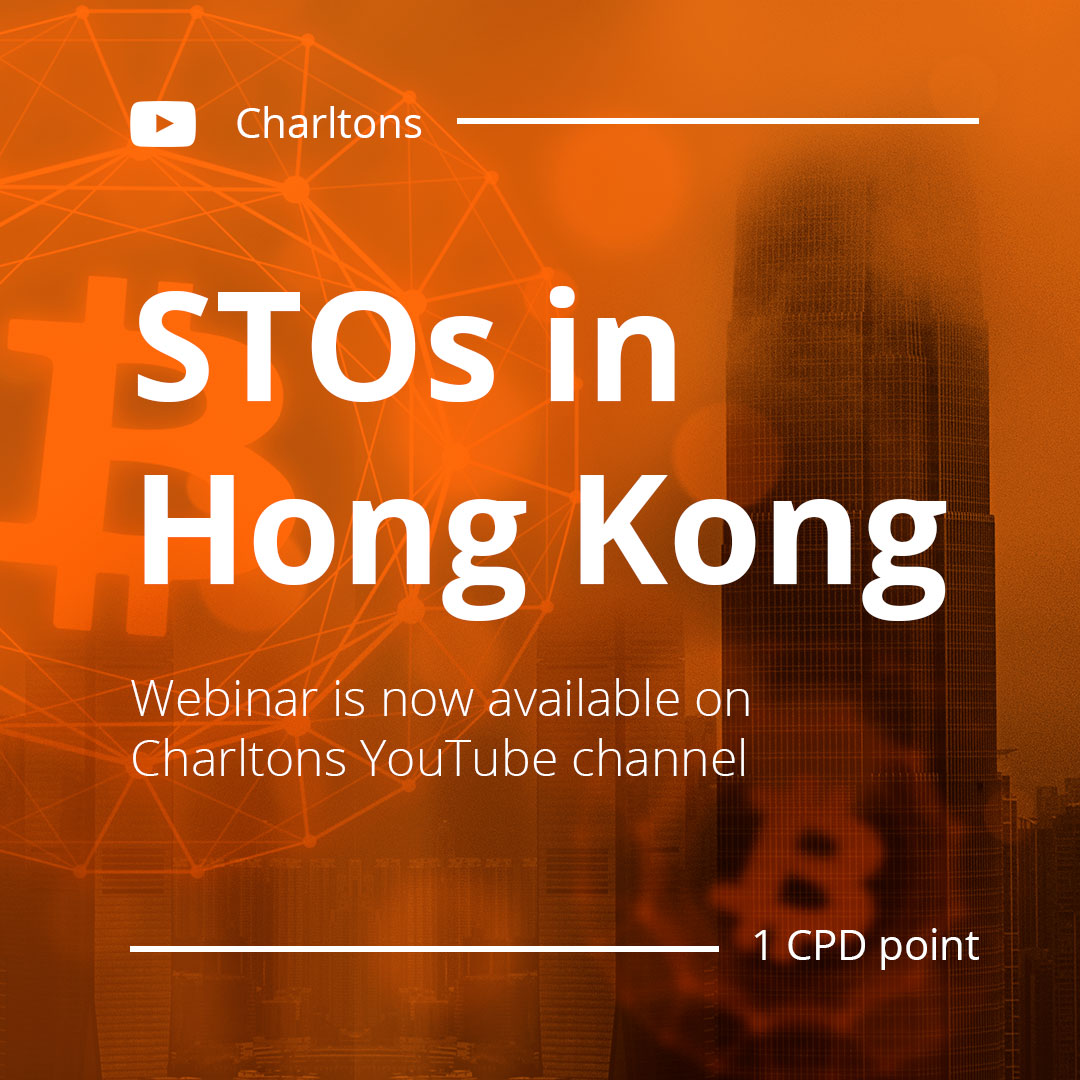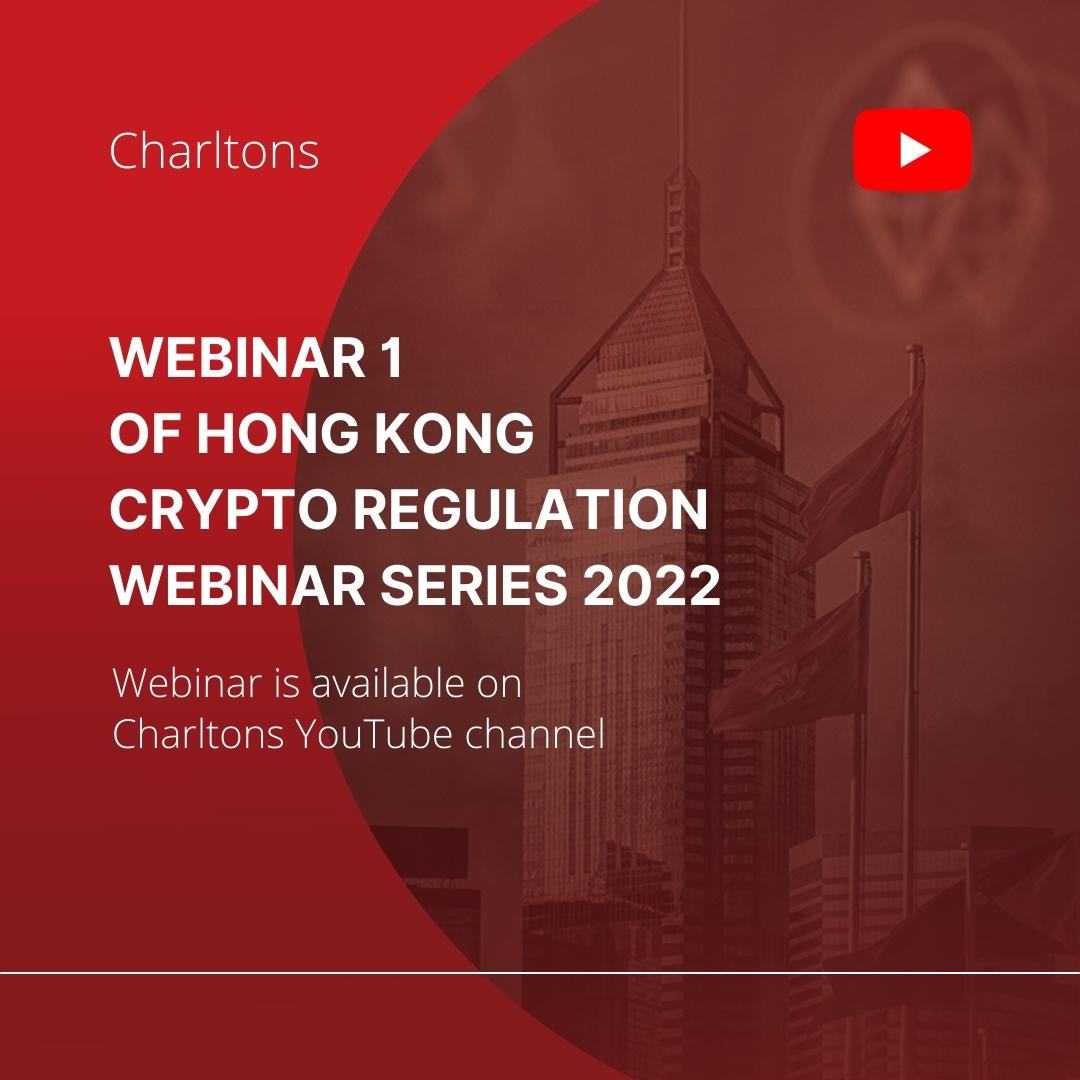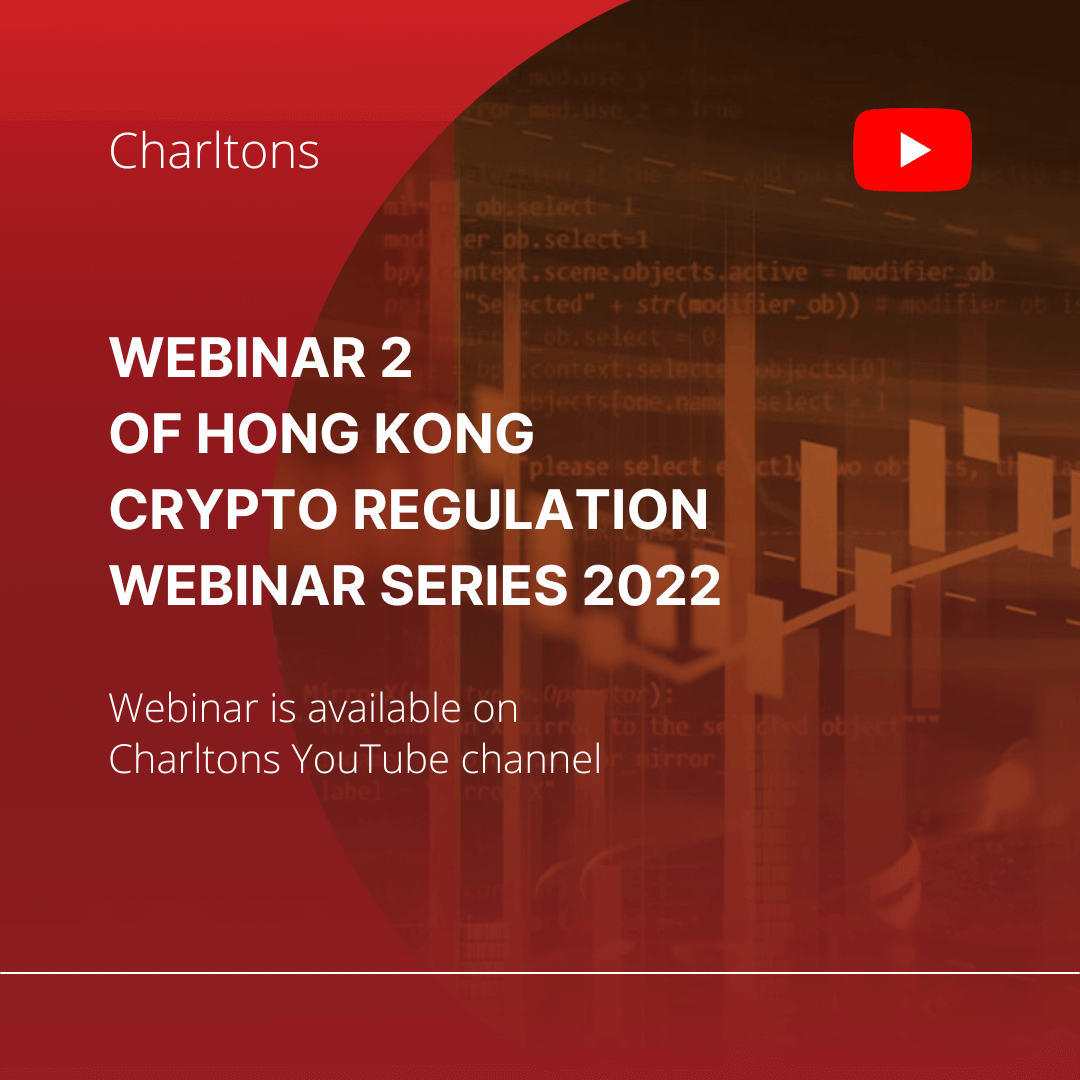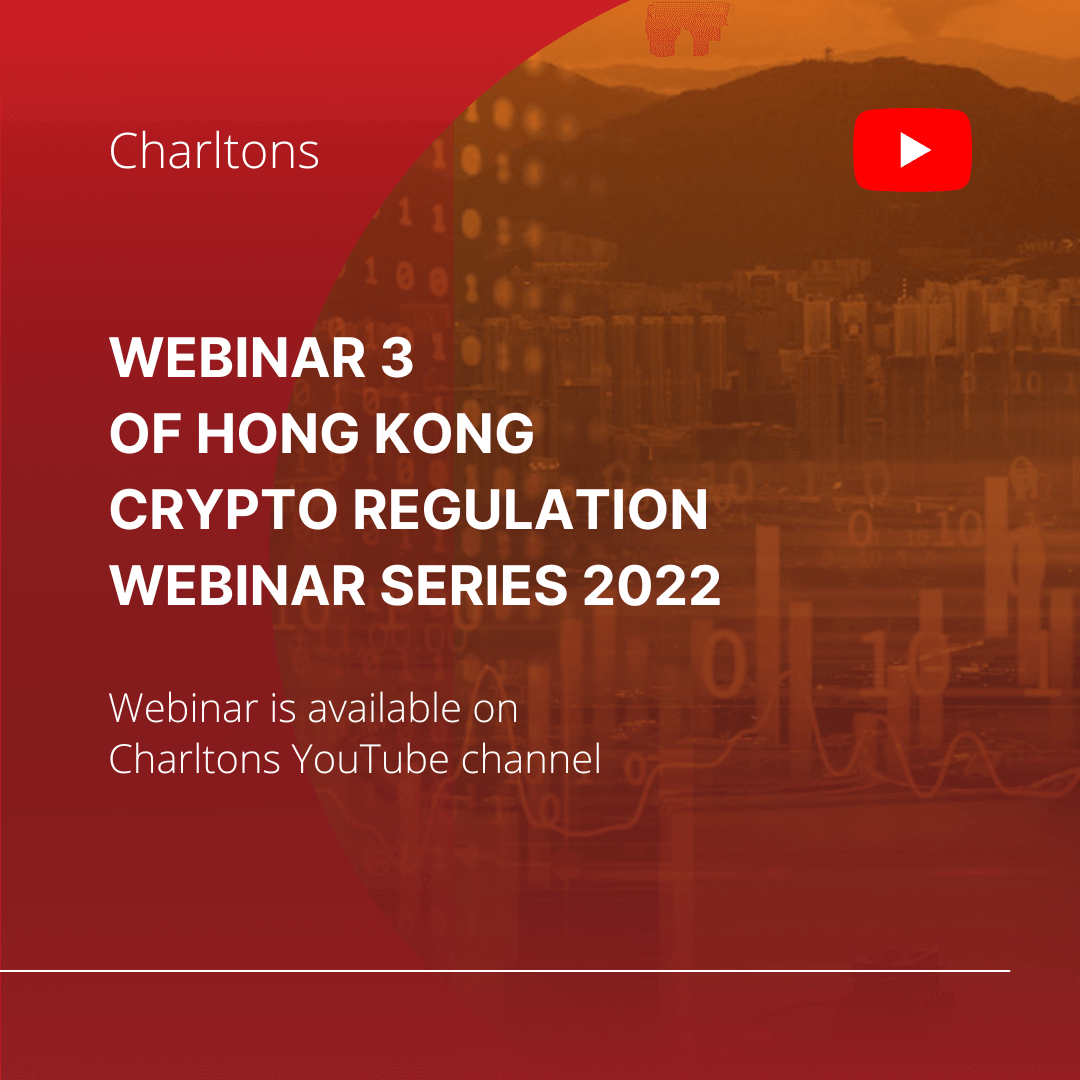Warning: Undefined variable $post in /var/www/charltons-en/wp-content/themes/divi-charltons-v4/functions.php on line 503
On 26 January 2022, Julia Charlton presented a webinar on STOs in Hong Kong
On 26 January 2022, Julia Charlton presented a webinar on STOs in Hong Kong.
The webinar covers the following topics:
- Background to securities token offerings
- Comparison of US & Hong Kong regulation of STOs
- Hong Kong regulation of STOs
- Regulatory implications of STOs being “securities” under the SFO
- How can licensed corporations in Hong Kong conduct activities relating to security tokens?
A recording of the webinar is now available here.
SECURITY TOKENS IN HONG KONG
Background to STOs
-
Instead of being stored on a single company’s database, a securities token is a digital or virtual asset issued on distributed ledger technology (DLT) in the form of a regulated security
-
Representation of traditional forms of investment products such as shares, bonds, interests in a collective investment scheme, loans and structured products
-
“Utility” or “network” tokens which regulators decide should be regulated as securities
Impact of US SEC decision on DAO
-
STOs evolved from and have come to replace initial coin offerings (ICOs)
-
US SEC’s regulatory determination – DAO tokens offered and sold by a “virtual” organisation called “The DAO” were an “investment contract” under the Howey test, and thus “securities”
-
Unregistered public offering of tokens breached US securities laws
DAO tokens
-
The proceeds of sale were invested in projects on the understanding that investors would receive a share of profits from the investments
-
A tokenised investment fund which, if publicly offered in Hong Kong, would have breached Hong Kong’s Securities and Futures Ordinance (SFO) – as an unauthorised public offer of interests in a collective investment scheme under section 103(1) SFO
-
Offering by unlicensed entities would breach the SFO’s licensing requirements
Initial coin offerings
-
A form of crowdfunding
-
The developer of a blockchain-based project would issue tokens to raise funds to finance the development of a blockchain-based project
-
On completion of the project, token holders gain access to a product or service available on the platform and the tokens are often used as a means of payment for the product or service provided
-
“Utility tokens” — intended to fall outside the scope of regulation, akin to a pre-paid voucher
US “securities” definition — the Howey test
-
An investment of money
-
An expectation of profit from the investment
-
An investment in a common enterprise
-
Profit must result from the effort of a promoter or third party beyond the investors’ control
SEC v Ripple
-
Filed an enforcement action against Ripple and 2 senior executives for allegedly conducting an unregistered securities offering of XRP tokens
-
Alleges that XRP is an “investment contract” within the Howey Test and a security subject to the registration requirements of the US Securities Act of 1933
Ripple:
-
XRP is a currency, like Bitcoin and Ether, which the SEC has said are not securities
-
XRP has a fully functional ecosystem and a real use case as a bridge currency that does not rely on Ripple’s efforts for its functionality or price
SEC Statement on Framework for “Investment Contract” Analysis of Digital Asset (April 2019)
Reliance on the efforts of others
-
Do purchasers rely on the efforts of others?
-
Are those efforts “significant… , that is… essential managerial efforts which affect the failure or success of the enterprise”
-
Is the network or virtual asset still in development or not fully functional at the time of the token offering?
Reasonable expectation of profits
-
Where token holders have the right to share in the enterprise’s income or profit or to realise a gain from the token’s capital appreciation which results, at least in part, from the development or improvement of the platform
-
Where they are offered broadly to potential purchasers rather than being offered to the expected users of the goods or services or those with a need for the network’s functionality
-
If the tokens are currently or will in future be tradable on a secondary market, this will make it more likely that they are securities
Other relevant considerations
-
Whether the tokens are sold for use by the purchaser
Unlikely to be securities where:
-
The distributed ledger network is fully developed and operational
-
The tokens can be used immediately (e.g. as a means of payment) on the network
When ICOs are STOs under US law
Whereas ICOs tried to operate outside regulation, STOs sought to bring themselves within the scope of US regulation, so that they could rely on various exemptions from the securities laws’ registration requirements:
-
Reg D (for offers only to “accredited investors” or not exceeding US$5 million)
-
Reg A (for companies with 2 years’ financial statements raising no more than US$50 million)
-
Reg S (available only to firms outside the US)
-
JOBS Act Crowdfunding Regulations (which allow firms to raise up to US$5 million but prevent resale for 12 months)
The tokenised securities market
-
The US is the leading jurisdiction for tokenised stock issuance, followed by Switzerland
-
Mostly used for financial services, particularly bond issues, and tokenised real estate
-
Ethereum as the most popular STO platform
-
Can never be transferred to an ineligible individual in the primary or secondary market
-
Digitisation improves transferability while reducing settlement and reconciliation costs
Tokenised shares in the US
-
Security token trading volume increased over 1,000% in 2020
-
The US has witnessed an increasing number of security tokens offered to professional investors in the US and overseas retail investors based on exemptions such as Reg A, Reg D and Reg S
-
STOs are seen in the US as a way of enabling companies to raise funds fairly quickly at a lower cost than a traditional IPO
Tokenised shares in Europe and Asia
Switzerland
-
The DLT Act allows uncertified securities to be issued and managed on DLT
-
Emergence of regulated entities on which tokenised securities can be traded
Germany
-
German Federal Financial Supervisory Authority (BaFin) — tokenised financial instruments are securities under German securities law
-
After prospectus approval, the securities tokens can be offered throughout the EU under the passporting system
Malaysia
-
Fusang Corp (FSC) has secured Labuan Financial Services Authority approval for an IPO of its equity tokens
Hong Kong regulation of securities tokens
The definition of “securities” in Schedule 1 to the SFO is wide and includes:
-
Shares, debentures, bonds or notes any body (incorporated or unincorporated), government or municipal government authority or any rights, options or interests therein;
-
Interests in a collective investment scheme;
-
Interests, rights or property (whether in the form of an instrument or not) that are commonly known as securities; and
-
Structured products
SFC’s action against Black Cell
-
The tokens were exchangeable for shares in the ICO issuer – making the offering equivalent to a share offering in Hong Kong in breach of section 103 SFO
-
The SFC however referred to the ICO potentially amounting to a collective investment scheme and to the potential breach of SFO licensing requirements
SFC statement re. ICOs
-
Warned seven ICO issuers and seven crypto exchanges of the regulatory consequences of offering or trading tokens that are securities under Hong Kong law
-
Entities contacted either confirmed their activities complied with Hong Kong’s securities laws or ceased their activities in Hong Kong
-
No details of the characteristics of the tokens offered or traded were provided by the SFC
Regulatory and licensing requirements for intermediaries
-
Where a token is a tokenised share or a tokenised debenture, it will be a security
A public offering of a securities token that is a share and debenture in Hong Kong will require compliance with:
-
The prospectus regime under the Companies (Winding Up and Miscellaneous Provisions) Ordinance; and
-
The restrictions on public offering without SFC authorisation under section 103(1) SFO
-
Offers by a decentralised autonomous organisation (DAO) not covered by C(WUMP)O prospectus regime
Intermediaries offering securities tokens will be required to be licensed for the relevant regulated activities:
-
Type 1 — marketing or trading securities tokens
-
Type 4 — advises on buying and selling tokens
-
Type 9 — fund manager investing in securities tokens
Collective investment scheme definition
-
An arrangement in 3 respect of property;
-
CIS participants should not have day-to-day control over the management of the property (even if they have the right to be consulted or to give directions about the management of the property);
-
Property should be managed as a whole by or on behalf of the person operating the arrangements, and/or the participants’ contributions and the profits or income should be pooled; and
-
Arrangement should be intended to provide participants with profits, income or other returns from the acquisition or management of the property
CIS definition vs Howey test
-
The definition bears similarities to the US Howey test
-
Would a token’s proposed listing on a crypto exchange and the potential for token holders to earn a return if the tokens appreciate in value bring it within the definition of a CIS?
-
Applying the reasoning used by the US courts, purchasers of tokens which have no immediate use would appear to be buying the tokens as investments rather than their use case on the platform
-
The categorisation of a token as a security can change over time
-
Lack of case law and SFC guidance
SFC Statement on Security Token Offerings (March 2019)
-
STOs – structured to have features of traditional securities offerings
-
Security tokens – digital representations of ownership of assets (e.g. gold or real estate) or economic rights (e.g. a share of profits or revenue) using blockchain technology
-
Securities tokens encompass digital versions of traditional securities such as shares, debentures and interests in investment funds
-
No elaboration on why digital representations of assets such as gold or real estate should fall within the definition of securities
Structured products & Regulated investment agreements
Any product where all or part of the return or amount due, or both, or the settlement method, is determined by reference to any one or more of:
-
Changes in the price, value or level of securities, commodities, indices, property, interest rates, currency exchange rates or futures contracts, or any combination or basket of any of these; or
-
The occurence or non-occurence of any specific events other than an event relating only to the issuer and/or the guarantor of the product
Regulated investment agreements
-
An agreement intended to provide any party to the agreement with a profit, income or other return calculated by reference to changes in the value of any property, such as equity-linked deposits
-
The definition excludes collective investment schemes
SFC regulation of fund managers managing funds investing in digital assets
De minimis threshold
-
The November 2018 regulatory framework extended SFC regulation of licensed fund managers to cover their fund management activities in virtual assets
Will regulate a Type 9 licensed fund manager in relation to its management of virtual assets where:
-
It has a stated investment objective of investing in virtual assets; or
-
It invests more than 10% of its gross asset value (GAV) in virtual assets
Licensing requirement for managers of funds investing in digital assets that are securities or futures contracts
-
A fund manager which only manages funds which invest only in virtual assets which are not securities or futures contracts does not require a Type 9 licence
-
It will need to be licensed for Type 1 if it intends to distribute the fund in Hong Kong
-
Any marketing or offering of interests in a CIS will be “dealing in securities” which requires a Type 1 licence under the SFO
SFC notification requirement
-
A fund manager intending to invest in virtual assets is required to notify the SFC even if it intends to invest less than 10% of its GAV in virtual assets
Licensing conditions
Professional investor protection
-
As defined in the SFO (which include the categories of high net worth investors under the Securities and Futures (Professional Investor) Rules)
Custody requirements
To assess and select the most appropriate custodial arrangement taking into account:
-
As defined in the SFO (which include the categories of high net worth investors under the Securities and Futures (Professional Investor) Rules)
-
Ease of accessibility to the virtual assets
-
Security of the custodial facility
Where the licensed fund manager opts for self-custody:
-
To document the reasons for self-custody and disclose the risks of self-custody to investors
-
To implement measures to protect the fund’s assets and effectively segregate the virtual assets from the fund manager’s own assets in the event of its insolvency
-
To use best endeavours to acquire and maintain insurance cover over the virtual assets
Licensing conditions for fund managers (Cont’d)
Valuation and liquidity
-
To select valuation principles, methodologies, models and policies which are reasonably appropriate in the circumstances and in the best interests of investors
-
To consider setting a cap on a fund’s investment in illiquid virtual assets and newly- launched ICO Tokens and their exposure to counterparties
Audit requirement
-
To appoint an independent auditor to audit the financial statements of managed funds
Liquid capital
-
Where a licensed fund manager holds virtual assets on behalf of the funds it manages, to maintain liquid capital equal to the higher HK$3 million or the amount of its variable required liquid capital
Venture Smart Asia
First fund manager to obtain a Type 9 asset management licence to manage funds investing in virtual assets
SFC regulation of crypto exchanges under the SFO
SFC’s November 2019 Position Paper on Virtual Asset Trading Platforms
-
Will only license centralised trading platforms that trade at least one virtual asset that is a security under the SFO
-
To be licensed for Type 1 (dealing in securities) and Type 7 (providing automated trading services)
Licensing conditions for crypto exchanges
-
Restrict provision of trading services to professional investors
-
Virtual assets to be held by a Hong Kong subsidiary of the platform operator which holds a licence as a trust or company service provider under the AMLO
-
An insurance policy covering the risks of custody of virtual assets and strict controls on the generation and storage of private keys
-
Restrict provision of trading services to professional investors
-
Virtual assets to be held by a Hong Kong subsidiary of the platform operator which holds a licence as a trust or company service provider under the AMLO
-
An insurance policy covering the risks of custody of virtual assets and strict controls on the generation and storage of private keys
Problems with the existing regulatory framework for crypto exchanges
Virtual assets which are securities that are traded on the platform have to:
-
Be asset-backed;
-
Be approved or registered with regulators in comparable jurisdictions (as determined by the SFC); and
-
Have been issued more than 12 months previously
-
No SFC guidance on which virtual assets will be regarded as “asset-backed”
-
Presumably this would include physically backed stable tokens such as Tether
-
Whether synthetic stablecoins would be considered asset-backed is unclear
-
The requirement for virtual assets to have been issued more than 12 months prior to their listing on the trading platform rules out most ICO tokens
-
Absence of a list of jurisdictions the SFC regards as comparable
Difficulty for crypto exchanges in satisfying regulatory requirements
-
There have not been any STOs in Hong Kong to date
-
The SFC has not spelt out that ICO tokens would be securities, nor the circumstances in which that would be the case
Regulatory implications of STOs being “securities” under the SFO
-
Intermediaries which market and distribute security tokens are required to satisfy the Code of Conduct including under para 5.2 to ensure that customer recommendations and solicitations in relation to security tokens are reasonably suitable for customers based on the information about customers of which intermediaries should be aware through the exercise of due diligence
Due diligence obligations
-
Where licensed intermediaries distribute security tokens, they need to conduct due diligence to develop an in-depth understanding of the tokens
-
Due diligence on the background and financial soundness of the management of the token issuer and of the rights attaching to the assets backing the securities tokens
-
Intermediaries are required to review all materials published in relation to the STO
STOs as “complex products”
-
Securities tokens are complex products under para 5.5 of the Code of Conduct and under the Guidelines on Distribution and Advisory Platforms, both of which set out additional KYC obligations for complex products
A licensed intermediary providing services to a client in complex products:
-
To ensure that the product is suitable for the client in the circumstances; and
-
To provide the client with information on the key nature, features and risks of the complex product
SFC Statement on Security Token Offerings
The SFC’s Guidelines on Distribution and Advisory Platforms apply to licensed intermediaries providing online distribution and advisory platforms for investment products:
-
Para 6.3 — to ensure that transactions in complex products are suitable for particular clients
-
Paras 6.7 and 6.8 — to provide information and warnings similar to the requirements of the Code of Conduct
Exemptions from all these requirements apply to clients who are:
-
Institutional professional investors; or
-
Corporate professional investors as defined in the Code of Conduct
Provision of information to clients:
-
To provide clients with information relating to STOs, including warnings of the risks of investing in virtual assets
-
To consult with the SFC before engaging in activities relating to STOs
Provision of information to clients:
-
To provide clients with information relating to STOs, including warnings of the risks of investing in virtual assets
Shortcomings of SFC regulatory approach
Provision of information to clients:
-
The investor protection requirements in the Code of Conduct only apply where a traditional intermediary is involved
-
Issuers thus have no obligation to ensure the suitability of their tokens for prospective investors or to disclose the risks of investing in them
-
As token issuers, their designers and developers are typically based offshore, the SFC has no regulatory jurisdiction over these foreign actors
-
If securities tokens are offered from outside Hong Kong, there will be only a breach of section 115 of the SFO if the offshore entity markets services to the Hong Kong public which would require it to be licensed in Hong Kong
-
There is no breach of the SFO if there is no active marketing of services to the Hong Kong public
-
There is no protection for Hong Kong investors who acquire tokens on an offshore platform
Julia Leung at HK FinTech Week November 2021
-
Financial institutions are increasingly looking to offer virtual assets to professional investors and their private bank clients
Can licensed firms provide trading services to clients?
-
Some licensed firms want to provide virtual asset trading services to clients by acting as an introducing agent or through an omnibus account opened with a virtual asset trading platform
Questions to be addressed by the SFC:
-
Whether these firms expose their clients to undue risks if the virtual asset trading platforms are unregulated or only regulated for limited purposes?
SFC regulatory concerns where licensed firms trade via omnibus accounts with crypto exchanges?
Questions to be addressed by the SFC:
-
Whether some of the regulatory obligations typically applied to licensed virtual asset trading platforms should be extended to licensed firms trading virtual assets on their clients’ behalf?
-
Whether firms should be required to conduct a knowledge assessment before providing virtual asset trading services to clients?
The future of STOs in Hong Kong
-
More appealing than an IPO for small and medium-sized enterprises and seed to Series A rounds rather than unicorn startups and billion-dollar publicly traded companies
Advantages over IPOs
-
No need to rely on central third parties
-
24/7 trading possible
-
Still subject to AML obligations





